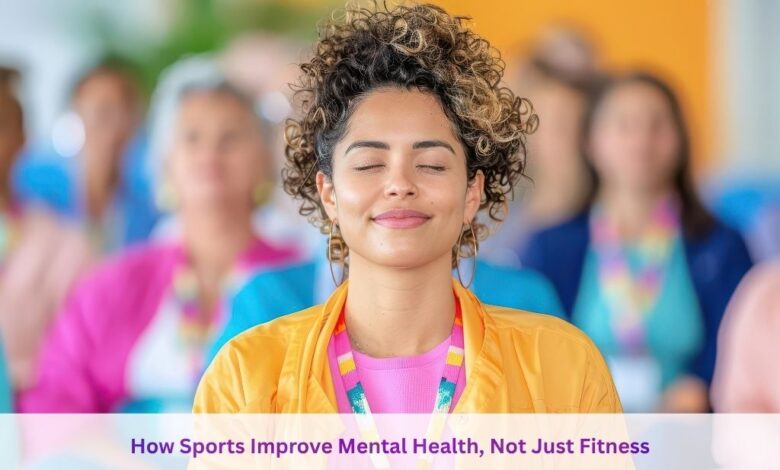How Sports Improve Mental Health, Not Just Fitness

More Than Only Movement Most of us imagine physical health when we hear the term “sports” strong muscles, quick legs, or a toned body. Sports, meanwhile, go beyond looking better or running faster. They also have a long-lasting influence on our mental condition. For many people, playing a sport helps to control stress, beat depression, boost concentration, and feel more confident in everyday life.
Let’s investigate how sports can improve our mental health in a natural, pleasurable manner.
- Stress Reduction: Sweating Out the Concerns Work, academics, relationships, and duties abound with anxieties in life. Stress is natural, but too much of it can affect our mental health. Sports function as pressure relief valves. When we play, our thoughts centres on the game rather than our troubles. Additionally, physical exercise helps our body produce endorphins natural mood enhancers. Many people feel lighter, more peaceful, and happier following a great game of football, a swim, or even a 30-minute run. Participating in athletics frequently can help lower the cortisol, the stress hormone. Less cortisol equals less anxiety. People who keep active through sports therefore cope more effectively with challenging days.
- Defeating Anxiety and Depression Naturally: Fear, and restlessness are brought on by anxiety. These are very real mental health issues that impact millions of people worldwide. Good cause underlies doctors’ recommendations of exercise as part of treatment programs. Sports, especially team games, aid to dispel the isolation that accompanies sadness. You meet others, laugh, move, and steadily reconstruct optimism. By raising brain levels of serotonin and dopamine substances that lift mood and lessen sorrow or anxiety exercise helps. Taking a stroll or playing a little badminton will help to start the healing process even if someone is reluctant to rise out of bed.
- Good mood and good sleeping are closely linked. Playing athletics allows us to release energy and our body feels weary in a good manner. That lets us sleep deeper and fall asleep quicker. Many times, those who frequently participate in sports claim they wake up more energized, have better thinking, and have reduced anger. A mind that has had enough rest approaches issues more quietly. And our self-assurance grows when we are less weary. Sleep is like a reset button for our mind. And sports assist us to push that button every day.
- Improving Confidence and Self-Worth: Sports show us how to aim and accomplish goals. Every little success whether it be striking a target in archery, learning a new move in karate, or timing your swimming better builds self-assurance. You start to believe in your own power as you go along. You discover that effort produces rewards. Self-esteem results from your pride in your accomplishments. Sports help young people especially teenagers a lot. Rather than fixating on body image or peer pressure, they come to appreciate their tenacity, abilities, and cooperation. This change results in a more robust identity.
- Developing Close Social Networks: Among the main sources of bad mental health is loneliness. Playing a sport brings you around like-minded people. It builds confidence and friendships. Winning or losing, the time you spend with your team fosters social ties. You develop ability to listen, speak nicely, support others, and be supported yourself. These social ties often go beyond the field or court. Deep friendships result from them that keep mental stability even in difficult situations and meaning via karate. Joining a seniors’ walking football team helped a retired man overcome his sadness. Swimming helped a busy mother find her serenity, which made her family stronger. Everywhere these stories may be found. Regular people one game at a time heal their mind by means of sports.
- Strengthening Discipline and Focus: Mental health is not merely about emotions. It also refers to our ability to manage everyday life. Sports impart concentration, discipline, and time management. These behaviours regular training, adherence to rules, punctuality, learning from errors help to build the brain. They support individuals in remaining disciplined and inspired everywhere, including at job or school. This mental discipline helps lower negativity, amnesia, and perplexity.
- Sports for All Ages: The Mental Benefits Don’t Expire Thinking that only youngsters profit from sports is erroneous. Sports help your mental health at every age whether you’re a child, an adult, or a senior. Children: Sports make them feel safe, foster friendships, and control their emotions. Teens: Acting lessens exam stress, rage, and peer pressure.
Adults: Sports provide relief from financial concerns, family pressure, and job stress. Senior: Light sports or group games lessen memory loss, loneliness, and sadness. Sports provide everyone, irrespective of age, the mental serenity they merit.
- Between Team Sports and Solo Sports, which is superior? Both team and individual sports have mental health advantages: Team sports like cricket, football, and volleyball provide social support, a sense of belonging, and improved communication abilities. Self-reflection, personal development, and intense concentration are aided by solo activities like swimming, jogging, bicycling. There is no one-size-fits-all. While other people love the laughter of team sports, some find calm in running alone. Choose what suits your body and mind that’s the secret.
- Athletics and Emotional Discharge: Occasionally we carry feelings we cannot convey: fury, sorrow, irritation. Sports provide a safe environment to express these feelings. Letting bottled up emotions out comes about from hitting a boxing bag, sweating through a tennis match, or kicking a ball hard. Sports help to process emotions in a good way instead of turning them either inward (which leads to sadness) or outward (which leads to conflict). Many times, people say they sob during a marathon run or feel calm following a strenuous game. These are emotional releases, and they are good.
- Playing outside multiplies the advantage: Playing outside in parks, meadows, or open spaces yields extra psychological benefits. Nature has its own peaceful influence. Fresh air, sunshine, and a natural setting help to lower tension and lift one’s attitude. Those who play in nature claim less weariness and anger. Even moving under trees can elevate your spirits.
- Inspirational stories: Let’s not overlook the many real-life tales that demonstrate how sports save lives. Through karate, a little girl battling anxiety discovered meaning and calm. By becoming a member of a walking football team for seniors, a retired guy overcame his depression. Swimming helped a busy mother find her tranquillity and become psychologically stronger for her family. Everywhere are these tales. Ordinary people treating their minds via sports one game at a time.
- Professionals in Mental Health Suggest It Often incorporated into treatment plans for sadness, ADHD, PTSD, and anxiety disorders, physical exercise can help to alleviate symptoms. Not only is this theoretical; it is supported by medical science and actual life success. Sports give structure, foster emotional development, and lessen symptoms. Sports therapy is included in many hospital recovery courses worldwide. Furthermore, mental health groups all over the world highlight sports as a vital means of well-being.
- What if you are not sporty? You don’t have to be a professional athlete. You don’t even need to be adept at the game. Participate, enjoy, and just move. Try: Daily straightforward walks Dancing in your bedroom Toss a ball with buddies. playing catch or badminton with family Enrolling in a good community yoga course The aim is to feel better both psychologically and emotionally, not medals. In a world of deadlines, anxieties, and monitors, sports present a means of returning to equilibrium. They enable us to move, laugh, sweat, and re-establish our relationship with others as well as with ourselves. It is a need, not a luxury. Mental health is Sports are also among the greatest instruments to preserve it.
Thus, The game is free to you whether you are a student, a parent, an office worker, or a grandparents. Pick up the ball then. Fasten your shoes. Leave the house. And play for your grin, your mind, and your soul. Sports and Emotional Intelligence: Education via the Game Among the usually neglected advantages of sports participation is the way it nurtures emotional intelligence. This calls awareness of your own emotions and control of them as well as detection of emotions in others. We feel a spectrum of emotions excitement, disappointment, fury, joy when we are on the field.
Learning to manage wins and losses enables us to approach the ups and downs of daily life more maturely. Particularly in team sports, athletes learn to handle their rage, regulate their responses, and keep composure under pressure. For instance, you develop to accept a decision you disagree with rather than going into a frenzy if a referee makes one. These little lessons develop emotional fortitude that also manifests in school, job, and interpersonal interactions. Sports Instruct Resiliency: Returning from Failure is inevitable in life for all of us. One’s loved one departs, a job interview fails, a company fails. Those who engage in sports usually get over such obstacles more quickly. Why? Because they have failed in a secure, regulated environment.
They were knocked down, missed goals, and lost matches, still rose. Resilience is this capacity to rebound. Furthermore, sports serve as a wonderful educator in this regard. Players learn not to give up whether they are battling in practice or losing a game. This habit of persisting in spite of failure helps one develop a more optimistic, more grounded attitude. Sports and Mindfulness: Living in the Moment Playing a sport grounds our attention. Living in the “now,” we quit ruminating about the past or future. This condition is called mindfulness, one of the best instruments for mental calm. Imagine a cricketer focusing on the ball, a dancer adhering to the tempo, or a runner aligning breath with step. These times renew the spirit and help the mind. Unlike scrolling on social media, playing sports unites us with the outside world our breath, our body, and our environment.
Last Words Being your best counts more than being the best. One step, one action, one game at a time. Let the games start, hence, for a healthier body and a happier mental state.
Our mental health often gets pushed to the side-lines in a fast-moving world under pressure, noise, and never-ending to-do lists. Our homes are cleaned more than our minds, and we show our phones more care than we show our thoughts. But sports, in their lovely simplicity, help us to remember what really counts. They remind us of our natural rhythm: movement, connection, and play. They remind us that we are humans, not machines, and that happiness, laughter, and work are just as vital as accomplishment and triumph. Sports are not just games using balls, bats, or rackets. These are mighty instruments for healing. They provide treatment sans the therapist, medication devoid the vial, and support without a word spoken.
The field changes to one in which one can breathe, let go, communicate, and develop. Your mind benefits every time you get out and move regardless of your level of competition or purely for enjoyment. Not only in your arms and legs but also in your heart and mind, you grow stronger. For some, athletics transforms into a way of living. It is not about winning prizes or having the ideal physique. It’s about reconnecting with life. It’s about waking up energized, sleeping tranquilly, and managing everyday stress without succumbing. Many people undervalue the influence of daily movement, team laughter, a modest victory in a weekend game, or even a purposeful walk. But these are the exact things that gradually restore a exhausted spirit.
You don’t have to wait for the ideal body or the “appropriate time. ” Fancy gear or costly clubs are not required. All you need is the will to start. Start humbly. Toss a ball, jump rope, engage in a local activity, or even stretch beneath the heavens. Your body will thank you, but your mind will thank you even more. Playing might help you if you feel lost, overwhelmed, or emotionally immobile. Let your thoughts and screens rest for a while. Allow your body to lead for a bit. Let the sadness ride away on the sweat.
Allow the rhythm of your heart to replace the noise in your mind. Let your muscles remind you that you’re still powerful. After all, we all need something that makes us feel connected, human, and complete. Sometimes, a game will be sufficient. a little motion. a chance to giggle once more. One motivation to look forward tomorrow. Thus, avoid only playing to keep fit. Play to remain sane. Play to be nice. Play to retain you.




